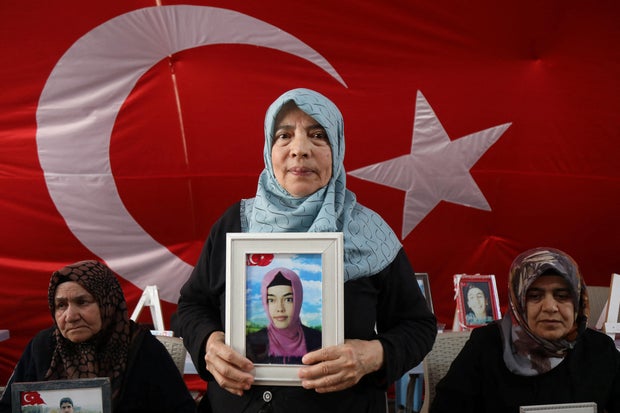The Kurdish group PKK announced on Monday that it will fully disarm and disband, ending its decades-long insurgency against the Turkish state, according to the Firat News Agency, an outlet linked closely with the group. The PKK has long been designated a terrorist organization by the U.S., Turkey, the European Union, NATO, and many other nations and entities.
The landmark move announced Monday will end a 40-year conflict that killed more than 40,000 people.
The group declared that it had completed its "historical mission" and had thus "decided to dissolve the PKK's organizational structure, with the practical process to be managed and carried out by Leader Apo [Abdullah Ocalan], and to end the armed struggle method."
The announcement came after the group's imprisoned founder and ideological leader, Abdullah Ocalan, made a call in a public letter in February, addressed to its leadership, asking the PKK to lay down its arms permanently. The PKK declared a unilateral ceasefire the following month.
The group was formed in 1978 with the ambition of creating a separate, independent homeland for Turkey's large Kurdish minority, but it later dropped its separatist ambitions and focused on achieving greater rights for the group within Turkish society.
 Hatice Levent holds a picture of her daughter Fadime, who is believed to have joined the outlawed Kurdistan Workers' Party (PKK), as families of young people believed to have been recruited by the PKK gather outside the local office of the pro-Kurdish DEM Party, as the PKK announces plans to disband and end its 40-year Turkey insurgency, in the southeastern city of Diyarbakir, Turkey, May 12, 2025.
Sertac Kayar/REUTERS
Hatice Levent holds a picture of her daughter Fadime, who is believed to have joined the outlawed Kurdistan Workers' Party (PKK), as families of young people believed to have been recruited by the PKK gather outside the local office of the pro-Kurdish DEM Party, as the PKK announces plans to disband and end its 40-year Turkey insurgency, in the southeastern city of Diyarbakir, Turkey, May 12, 2025.
Sertac Kayar/REUTERS
A spokesperson for Turkish President Recep Tayyip Erdogan's ruling Justice and Development Party (AKP) welcomed the announcement, calling it, "a significant step towards a terror free Turkey."
Spokesman Omer Celik said the PKK's decision should be "implemented with all its dimensions, without any shortcomings, and with concrete goals."
There were, however, no details immediately released about the technicalities of the group's disbanding, such as what would happen with all the weapons it has held for decades, or if its members would receive legal amnesty in Turkey.
In its statement, the PKK said the issue of Kurdish rights had come "to a point where it can be resolved through democratic politics," urging the Turkish parliament to take "a historical role" in completing the process.
Erdogan's government has had a complex relationship with the country's Kurds.
While some progress was made in restoring Kurdish rights since the AKP came to power in 2002, scores of Kurdish rights defenders were also imprisoned after the collapse of peace talks in 2015.
The announcement will have wider consequences for the region, especially in Iraq, Syria and Iran, all of which share borders with Turkey and have significant Kurdish minority populations of their own.
The disarmament of the PKK could also help clear up a thorny issue between the U.S. and its NATO ally. Turkey has long been critical of U.S. support for the Syrian Kurdish group YPG, which Turkey considers an extension of the PKK.
The YPG and allied Kurdish militias were instrumental allies to the U.S. in the war against ISIS in Syria.











 English (US) ·
English (US) ·